21 Nights | Europe
You will visit the following 11 places:

Split
Split is the largest Dalmatian city, the second-largest urban centre in Croatia, and the seat of Split-Dalmatia County. The city is located on the shores of the Mediterranean, more specifically on the eastern shore of the Adriatic Sea, spreading over a central peninsula and its surroundings, with its metropolitan area including the many surrounding seaside towns as well. An intraregional transport hub, the city is a link to the numerous surrounding Adriatic islands and the Apennine peninsula, as well as a popular tourist destination. Split is also one of the oldest cities in the area, and is traditionally considered just over 1,700 years old, while archaeological research relating to the ancient Greek colony of Aspálathos establishes the city as being several hundred years older.

Dubrovnik
Dubrovnik is a gorgeous Croatian city on the Adriatic Sea coast positioned at the terminal end of the Isthmus of Dubrovnik. It is one of the most prominent tourist resorts of the Mediterranean and listed as a UNESCO World Heritage Site since 1979. The city is nicknamed "Pearl of the Adriatic". The success of Dubrovnik’s tourist industry has brought a certain degree of complacency and self-satisfaction. Certain aspects of the city’s appeal remain immune to tourist numbers, however, most notably the uniquely stunning setting and the unjaded straightforwardness of the Dubrovčani themselves.
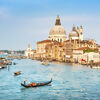
Venice
Venice is a city in northeastern Italy sited on a group of 118 small islands separated by canals and linked by bridges. The city is renowned for the beauty of its setting, its architecture, and its artwork. The city in its entirety is listed as a World Heritage Site, along with its lagoon. Venice has been known as the La Dominante, Serenissima, Queen of the Adriatic, City of Water, City of Masks, City of Bridges, The Floating City, and City of Canals. It has also been described as being one of Europe's most romantic cities. It is truly an amazing, stunning and interesting city for the adventurous to explore!

Corfu
Corfu, an island off Greece’s northwest coast in the Ionian Sea, is defined by rugged mountains and a resort-studded shoreline. Nicknamed ''the island of the Phaeacians'', Corfu is home to the Ionian University. Known also as Kerkyra, is the northernmost of the Ionian Islands in Greece. Located off of the far northwest coast of the country, Corfu lies in the Adriatic sea, east of Italy and southwest of Albania. Historically Corfu has been controlled by many foreign powers, notably the Venetians, French, and British.
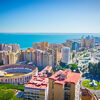
Málaga
Málaga is a large city in the southern Spanish region of Andalucia and capital of the Malaga Province. The largest city on the Costa del Sol, Malaga has a typical Mediterranean climate and is also known as the birthplace of famous Spanish artist Pablo Picasso. The city offers beaches, hiking, architectural sites, art museums, excellent shopping and cuisine. While more laid back than Madrid or Barcelona, Malaga is still the center and transport hub for the hugely popular Costa del Sol region, which is flooded with tourists in the summer, and the city has certainly cashed in on the sun and sand, with lots of new construction as well as hotels and facilities geared to tourists. However, Malaga also offers some genuinely interesting historical and cultural attractions in its old city and its setting on the coast is still beautiful.
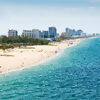
Fort Lauderdale
Fort Lauderdale is a city in the U.S. state of Florida, 28 miles (45 km) north of Miami. The city is a popular tourist destination, with an average year-round temperature of 75.5 °F (24.2 °C), and 3,000 hours of sunshine per year. Greater Fort Lauderdale which takes in all of Broward County hosted 12 million visitors in 2012, including 2.8 million international visitors. The district has 561 hotels and motels comprising nearly 35,000 rooms. Greater Fort Lauderdale has over 4,000 restaurants, 63 golf courses, 12 shopping malls, 16 museums, 132 nightclubs, 278 parkland campsites, and 100 marinas housing 45,000 resident yachts. Fort Lauderdale is named after a series of forts built by the United States during the Second Seminole War. The forts took their name from Major William Lauderdale (1782–1838), younger brother of Lieutenant Colonel James Lauderdale. William Lauderdale was the commander of the detachment of soldiers who built the first fort.
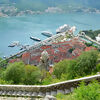
Kotor
Kotor is a coastal town in Montenegro with a population of about 13,500. It is well-known for its World heritage medieval structures (including churches and fortifications) and its stunning natural setting at the very edge of the mountain-rimmed Kotor Bay. It is situated in a most secluded tip of Boka Kotorska bay, in the northern part of the Montenegro coast on the Adriatic Sea. Kotor has developed around Stari Grad (local language for "old town"), the city's old town and best known landmark, which is listed with UNESCO World heritage sites. Kotor Bay is the deepest natural fjord-like bay in the Mediterranean Sea, and the scenery around it (including the steep mountains which come almost straight down to the waters edge) is spectacular.
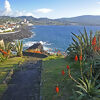
Ponta Delgada
Ponta Delgada is the largest municipality and administrative capital of the Autonomous Region of the Azores in Portugal. It is located on São Miguel Island, the largest and most populous in the archipelago. Cruise ships on repositioning voyages between North America and Europe often call there. Cruise-ship visitors to Ponta Delgada will often drive out into the countryside for visits to small villages and natural volcanic wonders. There's usually time afterward for a relaxed amble through the lovely port city, noted for its squares paved with black and white tiles, fabulous churches, and public buildings with their white-painted facades and brown-black volcanic stone trim. Given its dimension and the diversity of facilities and services it offers, Ponta Delgada is also the place for experiencing, a true gateway to the active discovery of the Azores Archipelago, with many things to do.

Cartagena
Cartagena is a Spanish city and a majornaval station located in the Region of Murcia, by the Mediterranean coast, south-eastern Spain. The metropolitan area of Cartagena, known as Campo de Cartagena, has a population of 409,586 inhabitants. Cartagena has been inhabited for over two millennia, being founded around 227 BC by the Carthaginian Hasdrubal the Fair as Qart Hadasht, the same name as the original city of Carthage. Much of the historical weight of Cartagena in the past goes to its coveted defensive port, one of the most important in the western Mediterranean. As far back as the 16th century it was one of the most important naval ports in Spain, together with Ferrol in the North. It is still an important naval seaport, the main military haven of Spain, and is home to a large naval shipyard. The confluence of civilizations as well as its strategic harbour, together with the rise of the local mining industry is manifested by a unique artistic heritage, with a number of landmarks such as the Roman Theatre, the second largest of the Iberian Peninsulaafter the one in Mérida, an abundance of Phoenician, Roman, Byzantine and Moorish remains, and a plethora of Art Nouveaubuildings, a result of the bourgeoisie from the early 20th century. Cartagena is now established as a major cruise ship destination in the Mediterranean and an emerging cultural focus. It is the first of a number of cities that eventually have been named Cartagena, most notably Cartagena de Indias (Cartagena of the Indies) in Colombia.

Ravenna

Civitavecchia
Civitavecchia is a town and comune of the Metropolitan City of Rome in the central Italian region of Lazio. A sea port on the Tyrrhenian Sea, the name ''Civitavecchia'' means "ancient town". The modern city was built over a pre-existing Etruscan settlement. The massive Forte Michelangelo was first commissioned from Donato Bramante by Pope Julius II, to defend the port of Rome. The upper part of the "maschio" tower, however, was designed by Michelangelo, whose name is generally applied to the fortress. North of the city at Ficoncella are the Terme Taurine baths frequented by Romans and still popular with the Civitavecchiesi. The modern name stems from the common fig plants among the various pools. And also next to the town is the location of the cruise ship docks. All major cruise lines start and end their cruises at this location, and others stop for shore excursion days that allow guests to see Rome and Vatican sights, which are ninety minutes away.









